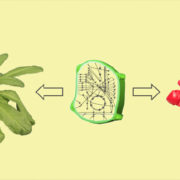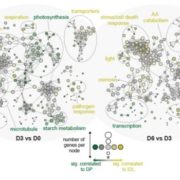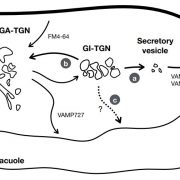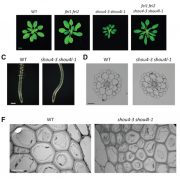Review: A newly proposed plastid: the xyloplast (Curr. Opin. Plant Biol.) ($)
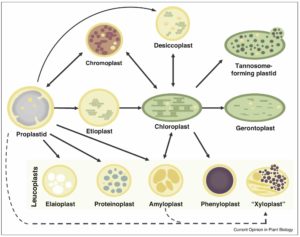 In its simplest definition, a plastid is an organelle that manufactures and stores essential chemical compounds used by its host cell. Numerous plastids exist beyond the familiar chloroplast. Chromoplasts synthesise and store carotenoid pigments, and provide their hosts with district yellow, orange or red colouring, while amyloplasts lack pigment but synthesise and store starch granules by polymerizing glucose. Others, such as gerontoplasts, elaioplasts and proteinoplasts also exist, all derived from the same proplastids that develop into chloroplasts in green plant tissues. Recently, Pinard and Mizrachi proposed a new specialized plastid, the xyloplast, which is found in the secondary vascular tissues of plants and is responsible for synthesising the aromatic amino acid precursors for monolignol production. The phenolic polymer lignin, which provides wood with its resistance to decay, mechanical strength and water transport effectiveness, is produced through polymerization reactions of monolignols in the secondary cell wall. The xyloplast is, therefore, vital to plant secondary growth, and given the importance of wood in global carbon cycling, the dearth of research into plastid biology in xylogenesis is surprising. Since enhanced knowledge of the role of plastids in secondary growth will greatly aid our overall understanding of plant vasculature and development, more research into this exciting topic is crucial. (Summary by Danielle Roodt Prinsloo) Curr. Opin. Plant Biol. 10.1016/j.pbi.2018.01.011
In its simplest definition, a plastid is an organelle that manufactures and stores essential chemical compounds used by its host cell. Numerous plastids exist beyond the familiar chloroplast. Chromoplasts synthesise and store carotenoid pigments, and provide their hosts with district yellow, orange or red colouring, while amyloplasts lack pigment but synthesise and store starch granules by polymerizing glucose. Others, such as gerontoplasts, elaioplasts and proteinoplasts also exist, all derived from the same proplastids that develop into chloroplasts in green plant tissues. Recently, Pinard and Mizrachi proposed a new specialized plastid, the xyloplast, which is found in the secondary vascular tissues of plants and is responsible for synthesising the aromatic amino acid precursors for monolignol production. The phenolic polymer lignin, which provides wood with its resistance to decay, mechanical strength and water transport effectiveness, is produced through polymerization reactions of monolignols in the secondary cell wall. The xyloplast is, therefore, vital to plant secondary growth, and given the importance of wood in global carbon cycling, the dearth of research into plastid biology in xylogenesis is surprising. Since enhanced knowledge of the role of plastids in secondary growth will greatly aid our overall understanding of plant vasculature and development, more research into this exciting topic is crucial. (Summary by Danielle Roodt Prinsloo) Curr. Opin. Plant Biol. 10.1016/j.pbi.2018.01.011



